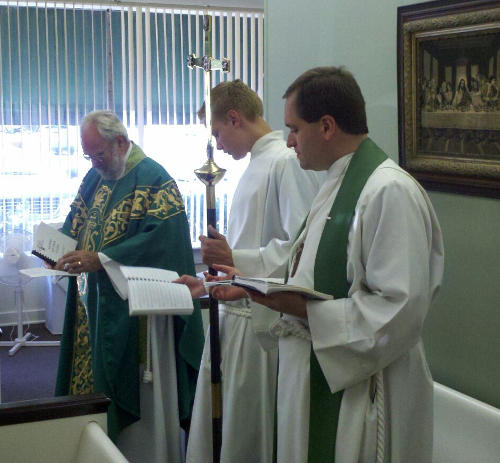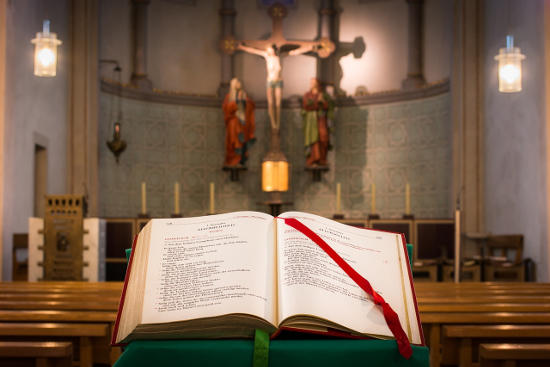A Pepper Grinder Post
Priests Instead of Pastors
This is the first in a two-part series I'm thinking of as "Why I like the Anglicans." Now, I know that talking about denominations, and especially why one is better than another, can be a very divisive and alienating thing. So, I want to say a couple of things right at the outset.
- I'm not really an Anglican. I mean, I'm going to an Anglican church right now. I'm even one of the worship leaders at this church. However, I don't think either my wife or I necessarily feel like we have found our spiritual home (something I don't expect to find until I die), and we don't know if we will be attending an Anglican church for the rest of our lives.
- I don't think the Anglicans are the best denomination around. I feel that most denominations have strengths, and they ALL have weaknesses. I have no idea what the best denomination is. I made the mistake of asking my kids to get me an Anglican mug I saw online last Christmas. When the mug came I saw that not only did it have "Anglican Church in North America," along with the classy-looking Anglican logo on one side, but it had, in bold red letters, "The biblically faithful way of following Jesus" on the other side. To be honest, that soured me on this drinking utensil. Not because I think Anglicans are biblically UNfaithful, but because I think that they, like other denominations that are even trying to follow the Bible, sometimes get it right, and sometimes don't. Also, while I think it is possible for people in an institution to be reasonably great, I don't think any institution is so good that it couldn't be ruined, fairly quickly, by the wrong people.
Another thing that occurs to me is that many people reading this might not know much about Anglicans. To be honest, I'm not sure how much I know about Anglicans. Before I had personal experience with this group, I just thought of a somewhat liberal denomination led by the Archbishop of Canterbury in England, who were kind of related to the Episcopalians in America. I thought of a group that was formed by people who mostly wanted to be Catholics, but struck out on their own because the Pope wouldn't let the king divorce his wife. There is some truth to this, but my own experience has been with a particular sub-stream of this movement. The people in the U.S. who call themselves Anglicans are people who split off from the Episcopalians as that denomination became more and more liberal. At the start, they placed themselves under the oversight of bishops in Africa, who were considerably more conservative than their counterparts in England and the U.S. At this point, I think Anglicans mostly have their own bishops in the U.S.
 If you have never been to an Anglican church, I'll just say that, to someone not used to a liturgical church, it might seem quite a bit like a Catholic or Eastern Orthodox service to you, with much of the service being read or sung from a book, and many things that are done pretty much the same each week.
If you have never been to an Anglican church, I'll just say that, to someone not used to a liturgical church, it might seem quite a bit like a Catholic or Eastern Orthodox service to you, with much of the service being read or sung from a book, and many things that are done pretty much the same each week.
Okay, now that I've spent almost as much time introducing the series as I was planning to spend on this whole first piece, let's get to the subject of this posting: priests instead of pastors. The church I go to doesn't have a pastor. Instead, it has two priests; Father N and Father J. They wear fancy robes, but they don't slaughter animals and sprinkle blood on an altar. They lead the service, give sermons, and offer communion. They also do most of the things that Protestant pastors do.
So what's special about that? It isn't the robes (though they do look pretty sharp). It has to do with how people view the priests. I'm sure it isn't like this in every Protestant church, but it seems to me that often the pastor is seen as the most spiritual person in a church. If everyone else ranges from a 2 to a 9 on the spirituality scale, the pastor is supposed to be a 10. To be fair, I think that in many cases, the pastors have not tried to portray themselves that way. I think it is often the churchgoers themselves who have pressed their pastors into that mold. My guess is that it gives people a good feeling to think that their pastor is a super-spiritual guy. Most of us, if we are honest, know that we fail to live up to the standard presented in the Bible in some or many ways. But, even if we blow it and say nasty things about a coworker behind his back, or look too long at how good another coworker's legs look in a short skirt, we can take comfort in the knowledge that our pastor wouldn't do something like that.
There's just one problem with this. Our pastor would do things like that. He, like us, is a person created in God's image, but deeply marred by the Fall. I'm afraid our expectation of a super-spiritual pastor is actually encouraging pastors to hide their faults behind a veil of hypocrisy.
So what's different about an Anglican priest? It's that, in my limited experience, they aren't seen as leaders because they are more spiritual than anyone else. They are seen as people that God has chosen to fill a special office.
I like Father N, but when he walks into church, he's just a serious Christian who loves to fish and looks sort of like Santa Claus. Then he goes into the room where the robes are kept (which I'm sure has some special name, because it seems like everything in liturgical churches has some unusual name that you might only have seen in a crossword puzzle) and puts on his robes. He comes out of the room as God's representative.
 And here's what I love the most. We don't sit there and think things like, "Oh we're so lucky to have Father J--he's the best preacher around. And Father N has such amazing spiritual insight, and his prayers are so beautiful." Instead, the focus is somewhere else. This is the most clear during some parts of the service, where the priests turn their backs to the congregation and face the big wooden cross at the front of the church. Who is it that the people come to see? It isn't the best pastor in town. It's the savior of the world, the Lord Jesus Christ. He gave us the words of life, and he surrendered his own life so that we could be forgiven and spend eternity with him. And he did this even though we had done nothing to deserve it.
And here's what I love the most. We don't sit there and think things like, "Oh we're so lucky to have Father J--he's the best preacher around. And Father N has such amazing spiritual insight, and his prayers are so beautiful." Instead, the focus is somewhere else. This is the most clear during some parts of the service, where the priests turn their backs to the congregation and face the big wooden cross at the front of the church. Who is it that the people come to see? It isn't the best pastor in town. It's the savior of the world, the Lord Jesus Christ. He gave us the words of life, and he surrendered his own life so that we could be forgiven and spend eternity with him. And he did this even though we had done nothing to deserve it.
I'm sure there are non-Anglican churches where people do not have a view of their pastor as a super-spiritual being. I'm sure there are Anglican churches where people have an unhealthy view of their priests. However, everything about what is said and done in the Anglican service, right down to the fact that the priests' own clothes are almost completely hidden by the robes they wear, seems engineered to take our attention off the man inside the robes and to focus it on Jesus.
I'm not writing this in hopes that you will all rush out and join Anglican churches. My hope is that we wouldn't push our church leaders (whatever we call them) into shoes they can't hope to fill. My hope is that our church leaders will avoid the temptation to take center stage. My hope is that we will all remember that there is one good shepherd, and that he isn't the person behind the pulpit.
- Pepper
Posted 2018-09-09
*In the next post I take a look at the Anglican view of communion.
**Image Credits: Priests and acolyte from St Thomas facebook page, front of Anglican church from Anglican Pastor.
